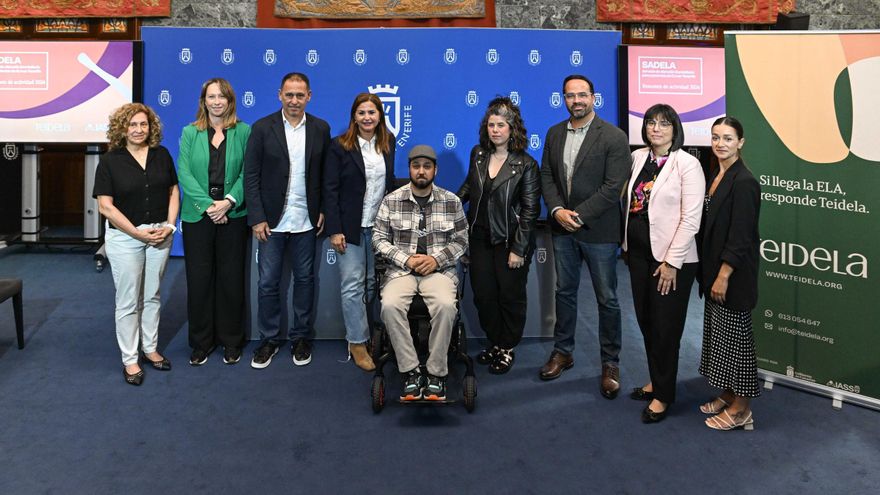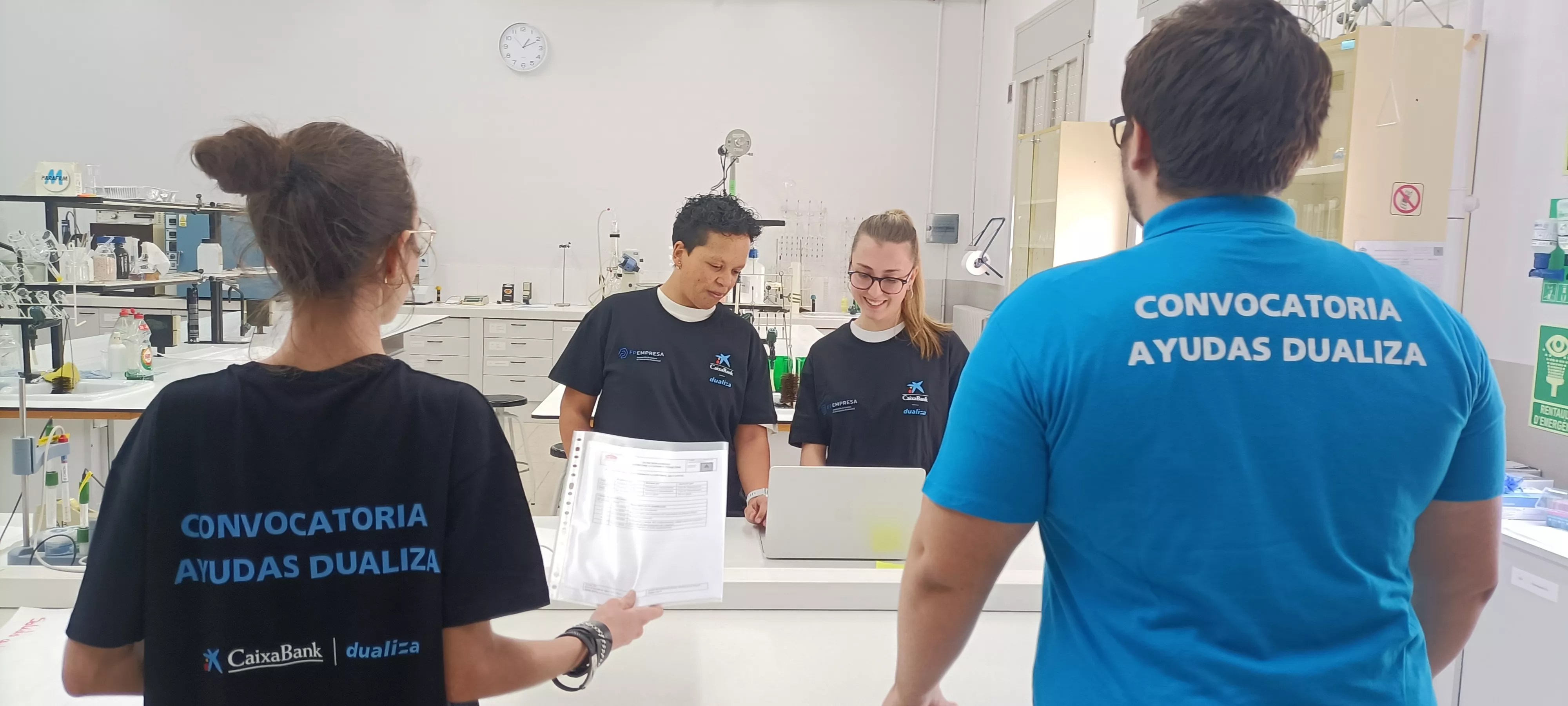
The Cabildo de Tenerife, alongside the affected individuals and the family entity S Teidela, is fostering the initiative for the third consecutive year, named SADELA (Home care service for patients with ELA), a model from Tenerife for the Canary Islands and Spain. The councillor for Social Action, L Águeda Fumero, together with the president of the collective, Marcelino Martín, unveiled the outcomes of the programme for 2024. In the grand hall of the Insular Palace, they particularly noted the presence of Víctor Guillermo Álvarez, who became the face and voice representing this struggle on the island for a day.
Insightful Lesson
Tenerife resident Víctor, aged 41, arrived from Icod de los Vinos with his partner Cristina to deliver an engaging lesson to the audience as he recounted his battle against the debilitating amyotrophic lateral sclerosis (ELA). His mother suffered from the illness, and he has inherited its genetic elements. He became emotional when speaking of her passing in 2018 and the anguish his father experienced, who took on the role of caregiver and, as he noted, ‘stopped living’ to care for his wife. “Speaking from personal experience.”
Diagnosis Journey
Since receiving his diagnosis in October 2024, Víctor, a karate instructor for the past decade, has been reflecting on his experiences. He explains, “I began to notice weakness in my legs until I received the diagnosis.” He emphasises the vital role of such associations, calling them “indispensable as they provide support for my family and me.” He encourages others to seek help “without fear” and quickly, as “time is of the essence.” His initial hesitations have turned to resolve. He concludes: “Initiatives like this are positive news.” Despite his condition, Víctor continues to pursue karate and aspires to become a referee.
Specialised Care
At the core of insular specialised support for individuals with ELA is the SADELA initiative, now renewed for its third edition, ETSE 2025. This project is tailored to all stages of the illness, providing specialised socio-healthcare that promotes functional independence and is already a crucial support for the physical, psychological, and emotional welfare of users.
Enhancing Quality of Life
Águeda Fumero highlighted that “the objective of this project is to enhance the quality of life through comprehensive assistance, addressing both physical and emotional well-being, not just for patients but also for their families.” The councillor noted that “this programme represents a determined commitment by the Cabildo, both quantitatively and qualitatively.”
Remembering Cati
Marcelino Martín reflected on the origins of the association, which is rooted in his sister, Cati Martín, who initiated the foundation of Teidela in 2021 to “dignify the lives of patients and their families.” Águeda Fumero took the opportunity to commend the dedication, effort, and generosity of Cati Martín, who, after receiving her diagnosis, devoted her time to serving others.
Pioneering Efforts
The president of Teidela remarked that “SADELA represents a brave, pioneering project in managing patients with this complex illness, serving as a model for other islands and Spain.” Marcelino Martín explained that “most ELA patients experience the progression of their condition at home,” as, according to the councillor, “ELA does not seek permission to enter homes, requiring families to learn to provide unfamiliar care.”
Statistics
SADELA commenced in 2023, supported by the Social and Socio-Health Institute (IASS), establishing itself as a benchmark in the comprehensive care of those with ELA. In 2024, the IASS extended its funding to the initiative, contributing €330,000 in 2025. According to the association, there are approximately 65 to 70 individuals with ELA in Tenerife, and last year, 31 were treated (15 men and 16 women). Martín explains why not all are fully integrated: “There are various ways to confront this illness, all deeply personal choices for individuals and their families. Some choose to fight, while others opt to retreat.”
Family Structure
“Not everyone has a cohesive family unit; not everyone has support or the same age range. Some residents from other countries find themselves alone, while older individuals may discover that their familial networks are limited,” he observed. He pointed out that receiving a diagnosis can be “devastating,” leading to a “fracturing” of the individual and their family. A key aspect of the service is home assistance, which has enabled 17 individuals to receive personalised support in their own residences. This service, also available on weekends, aids in daily activities and promotes independence. Furthermore, last year, 22 patients benefited from physiotherapy sessions, essential for those with ELA as their mobility progressively deteriorates. With therapeutic efforts, muscle degradation can be postponed and pain alleviated throughout the illness.
Nursing Support
The programme has also established a weekly nursing service for four patients. This monitoring is crucial for managing symptoms, administering treatments, and, above all, preventing complications resulting from the illness. Additionally, healthcare education has been provided to patients and their families to enhance their capability for self-management and home care.
Additional Services
To address the communication and swallowing challenges that accompany the progression of ELA, services have been offered to eight patients. The emotional toll of this illness not only impacts the patients but also their loved ones and caregivers. Consequently, the SADELA programme has provided psychological support sessions to a dozen individuals. Finally, a social work service has conducted 15 reviews of the Comprehensive Intervention Plan along with 14 new assessments, serving as a vital resource for guiding families. Meanwhile, the Sinpromi Social Technological Innovation sector promotes the initiative ‘My Eyes Fly’ as a support mechanism.
Key Findings
The summary of services delivered includes 138 hours of psychological support, 137 hours of logotherapy, 1,100 hours of physiotherapy, 28 hours of respiratory physiotherapy, and 63 hours of nursing, amounting to a total of 6,202 hours. Half of the 31 individuals attended lack governmental assistance, with their ages ranging from 60 to 90 years.
Legislative Considerations
Tenerife serves as a “model” and an “example of best practices” for the development of state legislation regarding ELA, and Victor acknowledges that the financial aspect is “slow,” although “the procedures have been accelerated.” Marcelino Martín urged for at least the allocation of funds and services for the most advanced cases, particularly those requiring tracheostomy. “This is the utmost priority,” as 24-hour care costs around €100,000 a year for a family. He believes this amount represents a substantial burden for public administration, stating his hope that those responsible can accept certain obligations akin to those undertaken by other administrations.
















